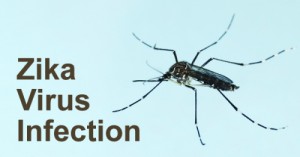 Zika virus is an emerging mosquito-borne virus that was first identified in Uganda in 1947 in rhesus monkeys through a monitoring network of sylvatic yellow fever. It was subsequently identified in humans in 1952 in Uganda and the United Republic of Tanzania. Outbreaks of Zika virus disease have been recorded in Africa, the Americas, Asia and the Pacific.
Zika virus is an emerging mosquito-borne virus that was first identified in Uganda in 1947 in rhesus monkeys through a monitoring network of sylvatic yellow fever. It was subsequently identified in humans in 1952 in Uganda and the United Republic of Tanzania. Outbreaks of Zika virus disease have been recorded in Africa, the Americas, Asia and the Pacific.
Signs and Symptoms
The incubation period (the time from exposure to symptoms) of Zika virus disease is not clear, but is likely to be a few days. The symptoms are similar to other arbovirus infections such as dengue, and include fever, skin rashes, conjunctivitis, muscle and joint pain, malaise, and headache. These symptoms are usually mild and last for 2-7 days. This is believed to cause microcephaly in infants born to infected mothers.
Transmission
Zika virus is transmitted to people through the bite of an infected mosquito from the Aedes genus, mainly Aedesaegypti in tropical regions.
Prevention
Mosquitoes and their breeding sites pose a significant risk factor for Zika virus infection. Prevention and control relies on reducing mosquitoes through source reduction (removal and modification of breeding sites) and reducing contact between mosquitoes and people.
This can be done by using insect repellent; wearing clothes (preferably light-coloured) that cover as much of the body as possible; using physical barriers such as screens, closed doors and windows; and sleeping under mosquito nets. It is also important to empty, clean or cover containers that can hold water such as buckets, flower pots or tyres, so that places where mosquitoes can breed are removed.
Special attention and help should be given to those who may not be able to protect themselves adequately, such as young children, the sick or elderly.
Risk:
Fetuses and newborns are particularly at risk. Birth defects have been linked to the Zika virus, including severe brain damage in babies. Fetuses in the first trimester are particularly susceptible to birth defects from this virus, according to the Pan American Health Organization. Zika can also lead to miscarriages. The greatest risk of Zika complications might be to newborn babies.
Although a definite cause has not been proven, a sizeable increase in newborns with microcephaly, a serious birth defect, has occurred in Brazil in babies born to mothers who were infected during their pregnancies with Zika virus. Zika virus infection also may be associated with Guillain-Barre syndrome in adults, a serious form of paralysis.
Treatment
According to the Centers for Disease Control and prevention CDC), one in five people infected with the Zika virus will become ill. Most people infected with Zika Virus have few or no symptoms, and may be unaware that they are infected with the virus.
Zika is typically diagnosed after a series of blood tests. There are no vaccines or medications available to prevent or treat Zika infections. If Zika is found, a medical professional will likely prescribe plenty of rest and fluids to help the body naturally combat the infection. Treatment is directed primarily at relieving symptoms using anti-pyretics and analgesics.
Credits for this article: http://www.who.int/mediacentre/factsheets/zika/en/

